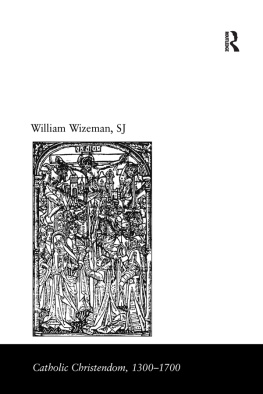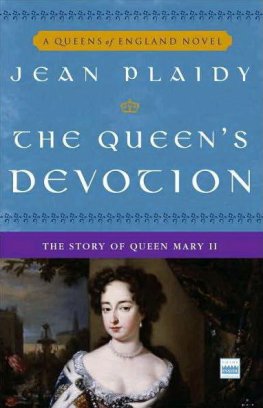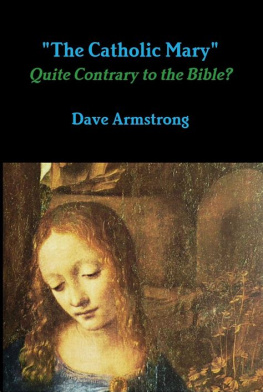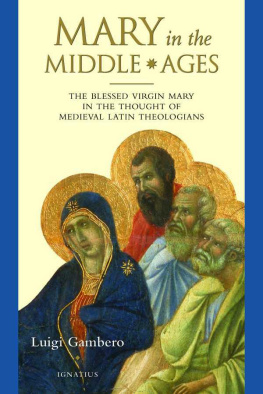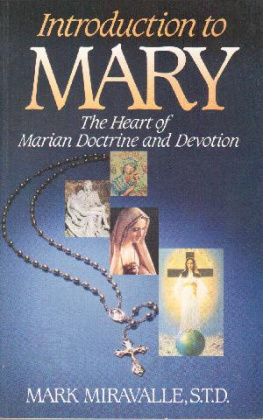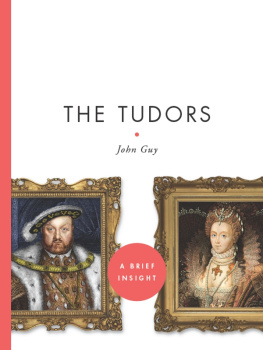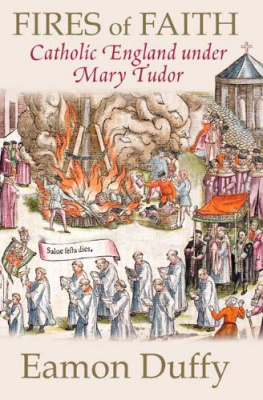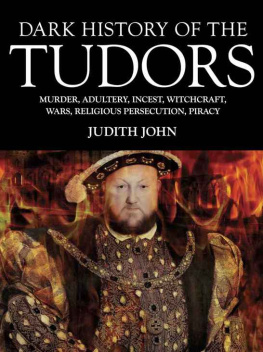THE THEOLOGY AND SPIRITUALITY OF MARY TUDORS CHURCH
The Theology and Spirituality of Mary Tudors Church
WILLIAM WIZEMAN, SJ
Corpus Christi Church, New York, USA
First published 2006 by Ashgate Publishing
Published 2017 by Routledge
2 Park Square, Milton Park, Abingdon, Oxon, OX14 4RN
711 Third Avenue, New York, NY 10017, USA
Routledge is an imprint of the Taylor & Francis Group, an informa business
Copyright William Wizeman 2006
William Wizeman has asserted his moral right under the Copyright, Designs and Patents Act, 1988, to be identified as the author of this work.
All rights reserved. No part of this book may be reprinted or reproduced or utilised in any form or by any electronic, mechanical, or other means, now known or hereafter invented, including photocopying and recording, or in any information storage or retrieval system, without permission in writing from the publishers.
Notice:
Product or corporate names may be trademarks or registered trademarks, and are used only for identification and explanation without intent to infringe.
British Library Cataloguing in Publication Data
Wizeman, William
The theology and spirituality of Mary Tudors Church.(Catholic
Christendom, 13001700)
1.Catholic ChurchEnglandHistory16th century 2.Catholic Church
DoctrinesHistory 3.Religious literature, EnglishHistory and criticism
4.Counter-ReformationEngland 5.EnglandChurch history16th century
I.Title
282.4209031
Library of Congress Cataloging-in-Publication Data
Wizeman, William.
The theology and spirituality of Mary Tudors church / William Wizeman.
p. cm.(Catholic Christendom, 13001700)
Includes bibliographical references (p.) and index.
ISBN 0-7546-5360-9 (alk. paper)
1. Catholic ChurchEnglandDoctrinesHistory16th century 2. Catholic
literatureHistory and criticism. 3. EnglandChurch history16th century. I.
Title. II. Series.
BX1492.W59 2006
230.24209031dc22
2005024713
ISBN 13: 978-0-7546-5360-8 (hbk)
Contents
The still-usual emphasis on medieval (or Catholic) and reformation (or Protestant) religious history has meant neglect of the middle ground, both chronological and ideological. As a result, continuities between the middle ages and early modern Europe have been overlooked in favor of emphasis on radical discontinuities. Further, especially in the later period, the identification of reformation with various kinds of Protestantism means that the vitality and creativity of the established church, whether in its Roman or local manifestations, has been left out of account. In the last few years, an upsurge of interest in the history of traditional (or catholic) religion makes these inadequacies in received scholarship even more glaring and in need of systematic correction. The series will attempt this by covering all varieties of religious behavior, broadly interpreted, not just (or even especially) traditional institutional and doctrinal church history. It will to the maximum degree possible be interdisciplinary, comparative and global, as well as non-confessional. The goal is to understand religion, primarily of the Catholic variety, as a broadly human phenomenon, rather than as a privileged mode of access to superhuman realms, even implicitly.
The period covered, 13001700, embraces the moment which saw an almost complete transformation of the place of religion in the life of Europeans, whether considered as a system of beliefs, as an institution, or as a set of social and cultural practices. In 1300, vast numbers of Europeans, from the pope down, fully expected Jesuss return and the beginning of His reign on earth. By 1700, very few Europeans, of whatever level of education, would have subscribed to such chiliastic beliefs. Pierre Bayles notorious sarcasms about signs and portents are not idiosyncratic. Likewise, in 1300 the vast majority of Europeans probably regarded the pope as their spiritual head; the institution he headed was probably the most tightly integrated and effective bureaucracy in Europe. Most Europeans were at least nominally Christian, and the pope had at least nominal knowledge of that fact. The papacy, as an institution, played a central role in high politics, and the clergy in general formed an integral part of most governments, whether central or local. By 1700, Europe was divided into a myriad of different religious allegiances, and even those areas officially subordinate to the pope were both more nominally Catholic in belief (despite colossal efforts at imposing uniformity) and also in allegiance than they had been four hundred years earlier. The pope had become only one political factor, and not one of the first rank. The clergy, for its part, had virtually disappeared from secular governments as well as losing much of its local authority. The stage was set for the Enlightenment.
Thomas F. Mayer,
Augustana College
The research and writing of this book, which began as an Oxford University D. Phil. thesis, could not have occurred without the labour and help of many people, and it is a pleasure to express my gratitude to colleagues, friends and benefactors.
I am much indebted to the staffs of the following libraries: the Bodleian Library, most especially that of Duke Humfreys and the Upper Reading Room; The British Library; Lambeth Palace Library; St Pauls Cathedral Library, especially the librarian, Jo Wisdom; The Society of Antiquaries; the libraries of the Modem History Faculty, the Theology Faculty and Campion Hall, Oxford; and the libraries of Fordham and Columbia Universities.
Seminar papers and lectures derived from this book have been read before the Sixteenth Century Studies Conference; the Reformation Studies Colloquium; the Early Modern Britain Seminar, Oxford; the Seminar on the Religious History of Britain from the 15th to the 18th Centuries, the Institute of Historical Research, University of London; the Ecclesiastical History Society; the Catholic Record Society; the Early Modem Research Group, Oxford; and the Faculties of Modem History and Theology, Oxford. I am grateful to those who offered criticism, encouragement and suggestions.
This work could not have been accomplished without my supervisor, Diarmaid MacCulloch. Besides his own superb scholarship, his insight, pastoral regard and humour have been a constant help and inspiration. I only wish this book could begin to do justice to his efforts and many kindnesses on my behalf.
Peter Marshall generously read and corrected most of this thesis while Professor MacCulloch was on leave. His criticisms are much appreciated, and he has been a great friend as well. Eamon Duffys words, both in print and in person, were the inspiration for this endeavour. I am most grateful to him and to Susan Brigden, my D. Phil examiners, and to Thomas Mayer and Thomas Gray, my editors at Ashgate, for their criticisms and suggestions.
I am very grateful for the help given by mentors and colleagues. Lou Pascoe, SJ, John OMalley, SJ, Janice Farnham, RJM and Judith Maltby have been mentors from the start. Alec Ryrie, Larissa Taylor, Andreas Lowe, Tom Betteridge, Peter Sherlock, David Skinner, James Clark, John Cooper and Owen Rees have been helpful in conversations about their research. Alexandra Walsham, Thomas Freeman, Susan Doran, Flora Winfield, Dermot Fenlon, Susan Wabuda, Christopher Haigh, Steven Gunn, Michael Questier, John King, Trevor Johnson, John Edwards, Ronald Trueman, David Loades, Kenneth Parker, Eric Carlson, Mark Bell and Henry Mayr-Harting have given me much encouragement.

